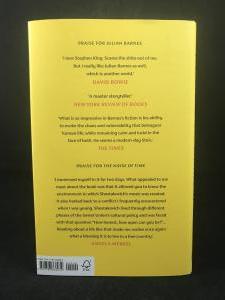
Neil loves the self-contained, enigmatic Elizabeth. His narrator is not motivated merely by curiosity. Some will be encouraged to reflect on their relationships with others some will read the book as a puzzle with no satisfactory resolution others will interpret it as an account of an obsession that takes over a person’s life.īut Barnes’ novel is not a philosophical treatise. Readers will respond in their own way to this challenge. Barnes is asking his readers for the same serious engagement that Elizabeth Finch demands of her students. The book is the most philosophical of novels, from a writer who has never hesitated to address philosophical issues.

In Elizabeth Finch, the narrator’s understanding of himself and his life is bound up with his attempts to understand a person who has had a profound effect on him. In Barnes’ Booker Prize-winning novel, The Sense of an Ending (2012), his narrator is forced to question the way he has understood his life and his relationships to others. But who is this person who has such an impact on his life? How should he understand her? Can he find a way of expressing what she means to him? Problems of understanding Neil, twice divorced and a drifter through life, describes her effect on him as “explosive”. Her aim, she tells them, is not to impart information or teach according to a syllabus, but to encourage them to find “a centre of seriousness in yourselves”. The dogged and decent Neil knows he is much less intelligent than his subject EF - is also, much less intelligent than his creator Julian Barnes - so that, as in a late Henry James novel, the reader may believe himself to understand more than the narrator can.Neil, the narrator of Julian Barnes’ latest novel, has the problem of interpretation posed for him by Elizabeth Finch, his teacher in a philosophy course on civilisation and culture for adult students. So the novel is in a sense a story of detection as well as a philosophical exploration of EF’s thought. He seeks help from her brother,a very different ordinary character, an amiable businessman who loved his sister, was on good terms with her, but shared none of her interests and little of her life. first made possible, though difficult, because she has bequeathed her papers to him. The third part is an attempt to reconstruct her biography. The second is an essay he has written on the Apostate which explores some Christian myths and asks, though clearly cannot answer the disturbing question EF put to her class.

The first part of the novel tells of EF’s teaching, the lunches Neil had with her and his speculation about her.


 0 kommentar(er)
0 kommentar(er)
